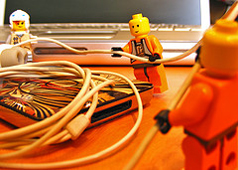This month would have been my dad’s 105th birthday, and, over the course of this month, I’m talking about some things that he taught me. I don’t remember my dad ever sitting me down and saying “”Listen up…you need to learn this…” He taught by his life example, and a lot of the things on my list are things that were just clear in how he went about living. I “learned something new every day” I spent with my dad, particularly as I got older and started paying more attention. But at the same time, I am very aware of things that I learned early, because that’s just how things were. To start from the beginning of this series of posts, click here.
Last time, I wrote about how my dad viewed community as being the human race. But part of community is family, and that’s another thing altogether.
With a couple of notable exceptions, most particularly in the case of my grandmother, I essentially never knew my dad’s family. Some of this was the generational periodicity of his side of the family. He was the youngest child, born in 1907. I am his only child, born forty years later. My daughter is my only child, and she was born in 1976. Thus the span between my great grandfather, who fought in the civil war, and my daughter is but 5 generations. Practically speaking, most all my first cousins on my father’s side were closer to my dad’s age than mine, and, in most cases, I never even met them. But I also didn’t meet them because we didn’t visit them much.
It wasn’t that he didn’t love his family. In fact, he supported a number of them financially. Rather I think, at this distance and from this perspective, it was that he didn’t think we (meaning my mother, he, and I) had much in common with his family.
But I think it was also a function of what I think is a common thing: my dad considered his in-laws to be his family. My mother’s brothers and sisters were my dad’s brothers and sisters too…for better (for the most part) and, from time to time, for worse.
And isn’t that a great leadership principle? Sometimes you don’t get to choose the people with whom you work. Good, bad, or indifferent, though, they are part of the team, and at some level it only makes sense to accept them for who they are, rather than complain about who they aren’t…or worse, get rid of them because you don’t want to take the time to get to know what they can contribute. And, as my father clearly showed me, over the course of a long term relationship, even the most disparate people can learn to work together when they share common goals and vision.
How about you? Do you consider your in-laws your family? Would you work with them? Please leave a comment and let me know.
Ipod shuffle status (What is this?): 4308 (Rednecks – Randy Newman) of 7875
…
Get my EBook The Choir in Modern Worship












You must log in to post a comment.